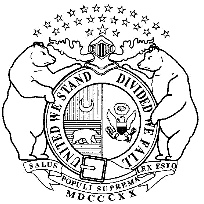
Supreme Court of Missouri
en banc
October 25, 2011
Effective January 1, 2012
Effective January 1, 2012
In re:
Repeal of subdivision 5.26, entitled "Appointment of Trustee," and subdivision (c) of subdivision 5.315, entitled "Immunity and Privileges," of Rule 5, entitled "Complaints and Proceedings Thereon," and in lieu thereof adoption of a new subdivision 5.26, entitled "Appointment of Trustee," and a new subdivision (c) of subdivision 5.315, entitled "Immunity and Privileges."
ORDER
1. It is ordered that effective January 1, 2012, subdivisions 5.26 and 5.315(c) of Rule 5 be and the same are hereby repealed and a new subdivision 5.26 and a new subdivision 5.315(c) adopted in lieu thereof to read as follows:
- 5.26 APPOINTMENT OF TRUSTEE
(a) Appointment. A circuit court, through the presiding judge or a judge of the circuit designated by the presiding judge, may appoint one or more members of the bar to serve as a trustee for a lawyer who maintained an office in the circuit if no trustee has been appointed and a showing is made that:
-
(1) The lawyer is unable to properly discharge the lawyer’s responsibilities to clients due to disability, disappearance or death, or
(2) The lawyer failed to comply with Rule 5.27 after disbarment or suspension.
Notice of the trustee's appointment shall be given by the clerk of the court to the chief disciplinary counsel who shall monitor and assist the work of the trustee as necessary and appropriate.
-
(1) Inventory active files and make reasonable efforts to distribute them to clients,
(2) Deliver any undistributed active client files and any inactive client files to the chief disciplinary counsel for action as required by this Rule 5;
(3) Take possession of and review the lawyer trust and business accounts;
(4) Make reasonable efforts to distribute identified trust funds to clients or other parties (other than the lawyer);
(5) After obtaining an order of the court, dispose of any remaining funds and assets as directed by the court; and
(6) Initiate any legal action necessary to recover or secure any client funds or other property.
The lawyer, to the extent possible, shall cooperate and promptly respond to reasonable requests for information from the trustee.
The trustee shall not disclose any information contained in any file under this Rule 5.26 without the informed, written consent of the client to whom the file relates except as necessary to:
-
(1) Carry out the order of appointment, or
(2) Comply with any request from an appropriate disciplinary authority.
The trustee shall report professional misconduct on the part of the lawyer as required by Rule 4-8.3.
-
(1) Within 120 days of appointment;
(2) Prior to being discharged if later than 120 days of appointment; and
(3) At such other times as directed by the appointing court.
The reports shall describe the nature and scope of the work accomplished and to be accomplished under this Rule 5.26 and the significant activities of the trustee in meeting the obligations under this Rule 5.26.
The final report must include accountings for any trust and business accounts, the disposition of active case files, and any requests for disposition of remaining files and property.
The trustee may apply to the appointing court for instructions whenever necessary to carry out or conclude the duties and obligations imposed by this Rule 5.26.
(f) Acceptance of Clients. With the consent of any client, the trustee may, but need not, accept employment to complete any legal matter.
(g) Legal Responsibility of Lawyer. The lawyer for whom a trustee has been appointed or the estate of a deceased lawyer for whom a trustee has been appointed is liable to the trustee for all reasonable fees, costs, and expenses incurred by the trustee as approved by the appointing court. To the extent that the approved trustee’s fees, costs, and expenses are paid by the disciplinary authority or other third party, the lawyer or the estate shall be liable to make reimbursement to the disciplinary authority or other third party for such payment.
(h) Fees, Costs, and Expenses. Application for allowance of fees, costs, and expenses shall be made by affidavit to the appointing court, which may enter a judgment in favor of the trustee and against the attorney or the estate of a deceased attorney for whom a trustee has been appointed. The application shall be made on notice to the chief disciplinary counsel, the lawyer or, if deceased, to the lawyer’s personal representative, or heirs. For good cause shown, an interim application for fees, costs, and expenses may be made.
As approved by the appointing court, the trustee shall be entitled to reimbursement from the lawyer or the deceased lawyer’s estate for:
-
(1) Reasonable expenses incurred by the trustee for costs, including, but not limited to, clerical, paralegal, legal, accounting, telephone, postage, moving, and storage expenses, and
(2) Reasonable attorneys’ fees.
In the absence of other funding sources, the chief disciplinary counsel may pay the approved fees, costs, and expenses.
5.315 IMMUNITY AND PRIVILEGES
* * *
(c) The advisory committee, chief disciplinary counsel, regional disciplinary committees, disciplinary hearing panels, trustees appointed pursuant to Rule 5.26, their staffs and representatives are immune from suit for any conduct in the course of their official duties.
3. It is ordered that this order be published in the South Western Reporter.
Day - to - Day
___________________________________
RICHARD B. TEITELMAN
Chief Justice